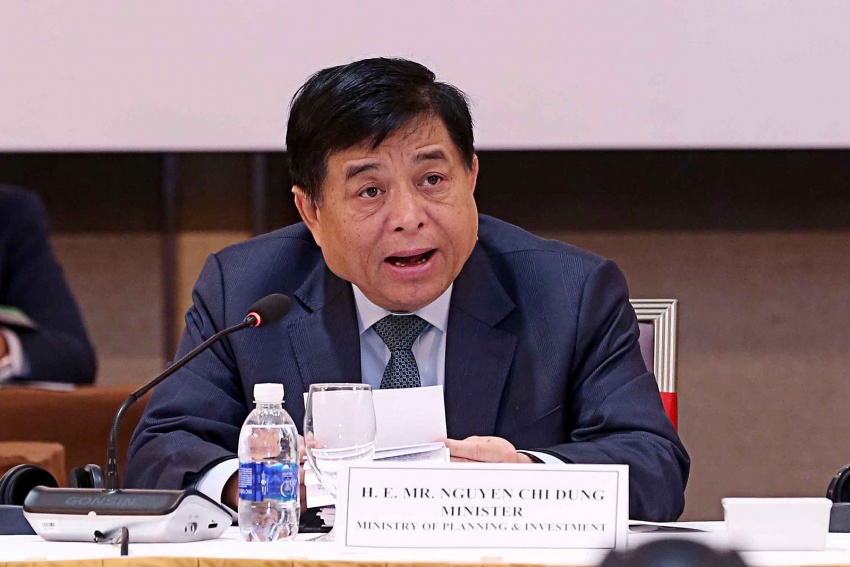PM listening to recommendations for economic development
 |
| MPI Minister Nguyen Chi Dung speaking at the opening forum |
The VBF, co-chaired by the Ministry of Planning and Investment (MPI), International Finance Corporation (IFC), and VBF Consortium, is attended by hundreds of government leaders and representatives from ministries, associations, and the business community. The prime minister also attended to deliver important directions.
At the opening forum, MPI Minister Nguyen Chi Dung reviewed the two years that Vietnam and the globe have been hit by the pandemic. In order to strengthen growth, the government’s first priority had to be controlling the spread and protecting people’s lives. Flexible strategies were needed to effectively achieve these goals.
“With the theme of restoring and developing supply chains, VBF is an opportunity for the business community to make comments and recommendations on the implementation of Resolution No.11/NQ-CP on recovery and development, as well as identify the responsibilities of state agencies and business communities to improve investment," said Minister Dung.
At the forum, Pham Tan Cong, chairman of the Vietnam Chamber of Commerce and Industry said that Resolution No.128/NQ-CP for controlling the pandemic has enabled enterprises to overcome many hurdles. However, the goals set for this year are challenging, including 6-6.5 per cent of GDP growth, and the implementation of the economic development programme.
The chairman said, "We highly appreciate the discussion and recommendations at the VBF today, which will be useful input for the government to implement recovery plans."
Despite some positive outcomes, he is worried about Omicron infections and the rise of patient numbers recently, which may impact the implementation of growth strategies. The restoration of supply chains is the foundation for the resumption of businesses and will contribute significantly to the success of the economic recovery programme.
Acting country manager of the IFC Amy N. Luinstra said that the annual VBF is significant as it allows dialogue between businesses and the government on sustainable development. Despite the positive results last year, Vietnam is also facing numerous difficulties including supply, productivity, disruption of value chains, and climate change issues. Strategic decisions are needed in the future to increase the scale of foreign-invested enterprises (FIE), and to strengthen links between domestic and foreign enterprises participating in the supply chains.
Therefore, Vietnam needs to innovate to overcome barriers by promoting digitisation, improving labour productivity, and moving towards green and sustainable growth to address the obstacles created by the pandemic. Luinstra believes that the country will continue to increase its resilience, achieve higher and more inclusive growth goals, and stated that the IFC will provide support.
During the forum, delegates also discussed solutions to solve medium- and long-term problems, including how business communities contribute to the sound recovery of the economy, the function of responsible business in global value chains, and the roles of local groups and FIEs in global trade.
Despite numerous challenges, Vietnam has achieved positive outcomes in various areas, contributed to by both local and foreign business communities. The macroeconomy is stable, inflation has been curbed, and economic balance has been re-established. Foreign investment inflows increased by 9.2 per cent, export and import turnover rose by 22.6 per cent on-year to nearly $670 billion, enabling Vietnam to reach 20th position on the global trade scale.
Following a slow start, Vietnam has become one of six leading countries in terms of vaccine coverage. The MPI minister said that the country’s recovery has now caught up with the rest of the world.
What the stars mean:
★ Poor ★ ★ Promising ★★★ Good ★★★★ Very good ★★★★★ Exceptional
Related Contents
Latest News
More News
- State corporations poised to drive 2026 growth (February 03, 2026 | 13:58)
- Why high-tech talent will define Vietnam’s growth (February 02, 2026 | 10:47)
- FMCG resilience amid varying storms (February 02, 2026 | 10:00)
- Customs reforms strengthen business confidence, support trade growth (February 01, 2026 | 08:20)
- Vietnam and US to launch sixth trade negotiation round (January 30, 2026 | 15:19)
- Digital publishing emerges as key growth driver in Vietnam (January 30, 2026 | 10:59)
- EVN signs key contract for Tri An hydropower expansion (January 30, 2026 | 10:57)
- Vietnam to lead trade growth in ASEAN (January 29, 2026 | 15:08)
- Carlsberg Vietnam delivers Lunar New Year support in central region (January 28, 2026 | 17:19)
- TikTok penalised $35,000 in Vietnam for consumer protection violations (January 28, 2026 | 17:15)

 Tag:
Tag:


























 Mobile Version
Mobile Version